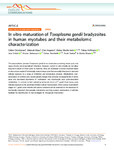2022-03-04Zeitschriftenartikel
In vitro maturation of Toxoplasma gondii bradyzoites in human myotubes and their metabolomic characterization
Christiansen, Céline
Maus, Deborah
Hoppenz, Ellen
Murillo-León, Mateo
Hoffmann, Tobias
Scholz, Jana
Melerowicz, Florian
Steinfeldt, Tobias
Seeber, Frank
Blume, Martin
The apicomplexan parasite Toxoplasma gondii forms bradyzoite-containing tissue cysts that cause chronic and drug-tolerant infections. However, current in vitro models do not allow long-term culture of these cysts to maturity. Here, we developed a human myotube-based in vitro culture model of functionally mature tissue cysts that are orally infectious to mice and tolerate exposure to a range of antibiotics and temperature stresses. Metabolomic characterization of purified cysts reveals global changes that comprise increased levels of amino acids and decreased abundance of nucleobase- and tricarboxylic acid cycle-associated metabolites. In contrast to fast replicating tachyzoite forms of T. gondii these tissue cysts tolerate exposure to the aconitase inhibitor sodium fluoroacetate. Direct access to persistent stages of T. gondii under defined cell culture conditions will be essential for the dissection of functionally important host-parasite interactions and drug evasion mechanisms. It will also facilitate the identification of new strategies for therapeutic intervention.
Files in this item

